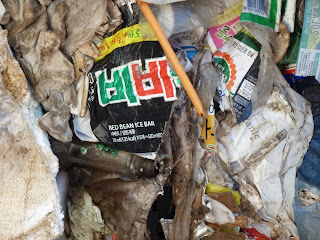EcoWaste Coalition Detects Lead in Some Disposable and Reusable Bags
Quezon City. Following the issuance by the government of a groundbreaking policy to prevent human exposure to lead, including its ban on packaging for food and drink, a waste and pollution watchdog revealed the presence of the highly toxic chemical in some disposable as well as reusable carry bags.
The EcoWaste Coalition stated that its discovery of lead in both disposable and reusable bags should prompt the packaging industry to align its manufacturing practices with the recently approved “Chemical Control Order for Lead and Lead Compounds” issued by the Department of Environment and Natural Resources (DENR) and for the latter to promptly craft the standards as provided in the said order.
The EcoWaste Coalition stated that its discovery of lead in both disposable and reusable bags should prompt the packaging industry to align its manufacturing practices with the recently approved “Chemical Control Order for Lead and Lead Compounds” issued by the Department of Environment and Natural Resources (DENR) and for the latter to promptly craft the standards as provided in the said order.
“The use of lead and lead compounds shall be strictly prohibited in the production/manufacturing of packaging for food and drink,” says Department Administrative Order 2013-24 signed by DENR Secretary Ramon J.P. Paje last December 23, 2013.
“Based on the screening we conducted, lead was detected in some carry bags that are used to pack food and non-food items. This practice should now cease given the known hazard of lead-containing products throughout their life cycle from production to disposal,” said Aileen Lucero, National Coordinator, EcoWaste Coalition.
“All carry bags will, over time, deteriorate. Wear and tear could liberate the lead out of the bag, causing it to leach to the food or get dispersed as dust. The leaded bags will eventually be disposed of in dumpsites or landfills or our rivers and seas, posing further problems to humans, other life forms and ecosystems,” she explained.
“While reusable bags are better alternatives to disposable plastic bags, manufacturers of these products should also see to it that they are free from lead,” she emphasized.
Lead, a potent neurological, reproductive and developmental toxin and an endocrine disrupting chemical, is one of the “ten chemicals of major public health concern,” according to the World Health Organization.
In an unprecedented investigation on lead in packaging materials, the group revealed that its portable X-Ray Fluorescence device detected lead on many samples of bags used for carrying food and non-food items:
1. FOR DISPOSABLE BAGS: 2,300 of the 4,300 samples (53%) of yellow sando bags had lead from 106 to 5,680 parts per million (ppm).
2. FOR REUSABLE BAGS: 52 of the 205 samples (25%) of assorted reusable bags made of natural and synthetic materials had lead from 106 to 7,308 ppm.
Overall, 2,153 of the 4,505 samples of disposable and reusable carry bags (48%) showed low or non-detectable levels of lead, indicating the technical feasibility of producing lead-safe bags.
The presence of lead is attributed to the use of leaded colorant, ink or paint on the bag designs and markings, or the use of lead-containing polyvinyl chloride plastic, the EcoWaste Coalition explained.
The EcoWaste Coalition further said that:
a. Reusable bags made of natural materials such as indigenous plants and trees were found to be devoid of toxic metals except when leaded ingredients are intentionally used in the product designs.
b. Among the lead-safe reusable bags found were made of bamboo, banana, buri and water hyacinth woven into “bayong” and baskets, bags and pouches from recycled paper, and various tote bags made of canvas, used flour sacks, worn out clothes and pillow cases.
c. Aside from being lead-safe, the EcoWaste Coalition finds these nature-inspired reusable bags better than the plastic-based ones, which are derived from petroleum, a non-renewable resource whose extraction, manufacturing and use generate greenhouse gases causing the climate to heat up.
d. The sampling shows the availability of a wide variety of natural as well as synthetic reusable bags that the business and consumer sectors are already using to replace single-use plastic bags.
“If synthetic reusable bags are preferred, consumers should choose those that are not made of PVC plastic and those without painted markings unless certified lead-safe,” Lucero said.
“While some plastic bags were found to contain low or non-detectable levels of lead, these single-use, disposable bags as far from being eco-friendly as these bags use and deplete natural resources and energy and spawn pollution, while reinforcing wasteful, throw-away behaviour,” she added.
-end-
Reference:
http://denr.gov.ph/laws-and-policies.html




Comments